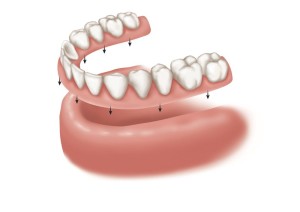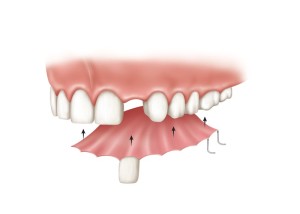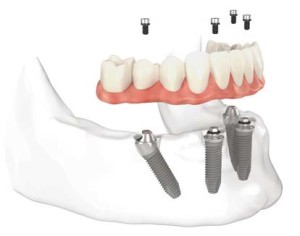Losing teeth can be quite distressing. Considerations such as replacement cost, convenience, your health and longevity may cause analysis paralysis, but it is important to replace them as soon as possible so you can eat and talk normally and to restore aesthetics and self-confidence.
Your restoration options include both dentures and dental implants, but which one is the best choice for your situation? The following guide is a comparison of the two and will help make your decision a little easier.
In This Guide
- What are dentures?
- What are dental implants?
- Benefits and drawbacks
- Other factors to consider
- Cost comparison
- All-on-4 alternative
- Choosing the right option
- What to read next
What are Removable Complete & Partial Dentures?
Dentures are removable appliances that replace missing teeth as well as some of the gum tissue. Complete or full dentures replace all the teeth in the upper or lower jaw, or in both jaws, while partial dentures are used to fill in gaps when some of the natural teeth still remain.

Complete dentures rest directly on the gums, whereas partial dentures are supported by clasps around existing teeth or with precision attachments that are fitted onto crowns. Dentures have a pink gum colored acrylic base that supports the denture teeth. Some dentures will include a lightweight metal framework for extra strength and support.

What Are Dental Implants?
A dental implant is a titanium post that is inserted into the jawbone, replicating the root of a natural tooth. The implant post osseointegrates or bonds strongly with the jawbone, creating an anchor which is used to hold a replacement tooth. They can be used to replace single or multiple teeth, supporting crowns, bridges and even dentures.
What Are the Benefits and Drawbacks of Dentures Compared to Implants?
| Dentures | Implants | |
|---|---|---|
| Jawbone | Bone loss over time can lead to further deterioration of facial structure | Helps stimulate and preserve remaining jawbone to maintain facial structure |
| Support | Sits on gums - can slip around and cause discomfort | Fixed to jawbone like natural teeth |
| Longevity | Typically last 7 to 15 years | Long-lasting solution |
| Cost | Less expensive, but often less effective | Higher up front cost, but better value in the long term. |
| Feeling | Take time to get used to - can feel fake and bulky | Feel and function like natural teeth |
| Appearance | Can be noticeable if they come loose or cause discomfort | Look close to the real thing. Supports your cheeks and lips |
| Maintenance | Need to removed regularly for cleaning | Brush and floss same as for regular teeth |
| Speech | May interfere with speech | No issues |
| Eating | Have to avoid certain hard or sticky foods | Helps restore chewing ability - removing food limitations |
| Invasiveness | No surgery required | 1 or 2 invasive surgeries |
Benefits of choosing dentures include:
Can Closely Match Gum Color
Replacement teeth will look quite natural as modern denture teeth come in many different shapes, sizes and shades. The pink acrylic used to replicate your gum tissue can be closely matched to your natural gum color.
Affordable
Dentures are the more affordable option, particularly if you need to replace multiple teeth.
Non-Invasive
The process for making dentures is non-invasive and unlike implants doesn’t require any surgery.
Easy to Adjust
Dentures are easy to adjust and modifications can be made to accommodate further tooth loss.
Support Face Structure
Correctly made dentures will support the cheeks and lips, restoring height between the upper and lower jaws so the face no longer looks as if it has collapsed inwards.
Drawbacks of selecting dentures include:
Not as Natural Looking
They don’t look quite as natural as implants since they display acrylic instead of actual gum tissue.
Higher Maintenance
They need to be removed and cleaned regularly, and must be left out of the mouth overnight to give the gums a chance to recover.
Can Shift Around
Dentures can sometimes slip around, particularly if they have been worn for a few years as the jawbone changes shape, becoming flatter and less able to provide retention. Messy and expensive denture adhesives only provide a temporary solution.
Harder to Talk With
Some people find it difficult to get used to speaking and eating with dentures and may lack the muscle control required to hold them in place.
Can’t Eat Certain Foods
There are restrictions on the types of foods that can be eaten. These restrictions may make it more difficult to have a balanced diet that provides all the nutrients required for good overall health.
They Trap Food
Dentures tend to trap food which can increase the risk of gum disease and decay of remaining teeth.
Fragile
Dentures can be quite fragile and are likely to break if dropped.
Not Permanent
They usually need to be replaced every three to six years (versus 15-20+ years for implants), although those with a metal framework and which are supported by natural teeth may last a little longer.
Removable
Some people have a psychological aversion to wearing dentures and would prefer not to have removable teeth.
Can Weaken Surrounding Teeth
Partial dentures can weaken the natural teeth supporting them, and it may be necessary for these teeth to be re-shaped or adapted slightly to accommodate the dentures clasps.
Other Factors to Consider
Insurance coverage
Dentures are generally covered by most dental insurance plans, and your insurance may pay between 15% and 50%. Dental implants are often classified as a cosmetic procedure, so the costs aren’t typically covered. It is worth checking with your provider as it is possible your insurance might cover a portion of the implant crown, bridge or denture.
Durability
Implants that are properly cared for can last for many years, or even for life, so costs can be lower in the longer term. In comparison, dentures will need replacing relatively frequently.
Long-term oral health
Implants help to preserve bone and prevent gum tissue from shrinking by stimulating them with the forces produced by chewing, which reduces your risk of losing more teeth. Dentures do not have this effect, and an ill-fitting restoration can even accelerate bone loss if it places too much pressure on the gums and underlying bone.
Oral hygiene
Dentures need to be cleaned meticulously every day. In comparison, implants can be maintained by simply brushing and flossing.
Improved appearance
Implants look very natural and function in a way that is similar to your own teeth. Dentures can feel very large and bulky in comparison.
Comfort
Dentures often slip around or may click during eating and speaking whereas implants cannot move and as they are held rigidly in place by the jawbone.
Food may taste better with implants
It will be easier to chew properly and you should be able to eat a greater variety of food. If they are used to replace upper dentures, you’ll notice food is tastier as your upper palate (which contains thousands of taste buds) will be uncovered.
Protecting your natural teeth
Implants help prevent neighboring natural teeth from moving out of position, and they don’t require these teeth to be modified in any way. Partial dentures can require neighboring teeth to be modified or ground down.
Cost Comparison
Dentures
The cost of dentures can vary according to where you live and the quality of dentures chosen. While it is possible to purchase cheap dentures, you’ll often find you get what you pay for. High quality restorations use materials and techniques that replicate the appearance of natural gum tissue and teeth. These materials tend to be stronger and longer-lasting and may even include a warranty.
| Full Set of Dentures | |
|---|---|
| Basic | $600 to $1000 |
| Mid-Range | $1000 to $2000 |
| Premium | $4000 to $8000 |
| Partial | $700 to $1800 |
| Implant Supported | $30000 to $50000 |
Basic Quality
For one arch of teeth is typically between $300 and $500, or an average of $1,000 for a complete set of full upper and lower teeth. They usually come with a limited warranty, come in a pre-set size and don’t last as long as the higher quality options.
Mid-Range Quality
Replacing one arch costs between $500 and $1,500, while a full set would be $1,000 to $3,000. These usually come with a 1-2 year warranty and have a somewhat personalized fit.
Top Quality
Dentures using the best available materials cost $2,000 to $4,000 per plate or $4,000 to $8,000 or more for a full set. This includes several follow up visits to ensure a completely personalized, comfortable custom fit and a warranty for 5 to 10 years.
Partial Dentures
Removable partial dentures start at $300 to $500, but average between $700 and $1,800. If you have a metal framework then you could end up paying $2,000 – $4,000 or more.
Dental Implants
They tend to be more expensive than dentures, but the costs depend on your dentist’s experience and popularity, your location, your dental health, the type of implant used, what diagnostic tests are required (x-rays, CT scan, etc.) and whether or not additional procedures such as a bone graft or sinus lift are required.
Other factors to take into consideration include the number of teeth being replaced and the number of implants required as multiple missing teeth can be replaced with a bridge or denture supported by only 2-4 implants.
Single Tooth Implant
It typically costs $1,000 to $3,000 to have a single tooth implant placed by a dentist. The implant crown will be extra and can cost anywhere from $500 to $3,000 depending on the materials used. The average cost of a single tooth implant is approximately $4,250 but your dentist will be able to give you a more accurate estimate after your initial examination.
| Single Tooth Implant Cost | |
|---|---|
| Implant Only | $1000 to $3000 |
| Abutment & Crown | $500 to $3000 |
| Average Total Cost | $4000 |
Multiple Implants
The cost of multiple implants can be anywhere from $3,500 to $30,000 or even more. Two can support a three or four tooth dental bridge, and the average cost of this treatment is approximately $8,500.
| Multi Implant Cost | |
|---|---|
| 3-4 Tooth Bridge (Two Implants) | $5000 to $15000 (avg. $8500) |
| 2-6 Implants With Dental Bridge | $3600 to $29000+ |
| Top & Bottom Supported Dentures | $25000 to $95000+ (avg. $34000) |
Implant Supported Dentures
If you wish to replace your upper and lower denture with implant supported dentures or with a fixed bridge, then you can expect to pay anywhere from $25,000 right up to $95,000, with costs averaging approximately $34,000. This is a considerable sum of money, but it is important to remember how many teeth will be replaced during this procedure and that it will require multiple implants.
Combination of Both: All-on-4
 The All-on-4 technique is used to replace an upper or lower regular denture with a fixed denture that is supported using four implants.
The All-on-4 technique is used to replace an upper or lower regular denture with a fixed denture that is supported using four implants.
This technique is based on the way the implants are angled, as the two at the front of the mouth are placed at a 90° angle, while the two on either side are placed tilted backwards at a 45° angle in order to maximize the use of available bone to hold the denture securely in position. This is a specialized technique that requires additional training and planning.
Making a Decision: Dental Implants or Dentures?
Dental implants are largely regarded as the gold standard for replacing missing teeth due to the way they replicate natural tooth roots which helps preserve the jawbone and gum tissue in addition to providing the best aesthetics. In the same vein, dentures can be tricky to wear, restrict your food choices and need to be replaced more frequently.
However, there are many situations where dentures are the best option. Implants aren’t suitable for everybody. Dentures could be the answer if you are opposed to having oral surgery, grind or clench your teeth, can’t quit smoking or have a medical condition that significantly increases the risk of implant failure such as diabetes or any disease that compromises your immune system. They are also a great short-term option (several years) if you are currently unable to afford implants.
Dentures may seem to be cheaper initially, but a recent study found that implants are a cost-effective option for replacing single teeth. For replacing multiple teeth, implants have higher initial costs but better improvements in oral health-related quality of life compared to other treatment options.
What to Read Next
- How to Much Do Dental Implants Cost?
- Dentures Cost: Partial, Full, Permanent & Immediate
- Dental Implants vs. Bridges
- All-on-4 Dental Implants Cost & Procedure
- What Are Mini Dental Implants?
Over to You
What did you decide was the best option for you? Let us know in the comments why you’re leaning towards implants or dentures.
I am thinking about doing a complete set of upper and lower implants. I was wondering if anyone had been able to deduct some or all or the cost of this kind of procedure in their taxes?
Presently I have a full lower denture and 8 natural teeth in the upper at the front of my mouth, nothing else
I’m 81 on a small gov’t pension so I don’t have a lot of money. What is the best I could afford. Could I turn the lower full denture into a permanent denture and get a partial for the top as I’ve heard the suction will hold them in place?
Joseph,
Having a denture on the upper and lower arches supported by only 2 implants each can be done, but they will not be fixed in the mouth. By that, I mean they will still essentially be removable dentures. You would be getting what’s called an Overdenture, which does add support to a typical set of dentures, but it isn’t fixed in the mouth like an All-on-4 would be. Even for the Overdenture (which is a less expensive option than the All-on-4) anything under 20k for an upper and lower set combined is very cheap, almost to the point of the office not being able to cover their own expenses. I would be very cautious before getting this done, especially if you dentist is a general dentist, and not a specialist that does this type of work on a normal basis. Implant placement can (and will) have a high fail rate if the doctor placing the implants is not experienced in what he/she is doing. Before spending that kind of money, I’d make sure I found someone who I was confident knows what they are doing.
Hope that helps.
probably not. But they could use the same teeth if you like them. But it wont reduce the cost.
I have new dentures did not get the 4 implants at the time can I use my dentures and get the 4 titanium post using existing lower dentures have only worn them 5 times because they move to much when I try to eat got them at affordable dentures they are the high priced ones.
That completely depends on the quality of your dentures, and if you can find a doctor who will use your existing set. But yes, it is physically possible to convert your existing set into something that can be implant supported.